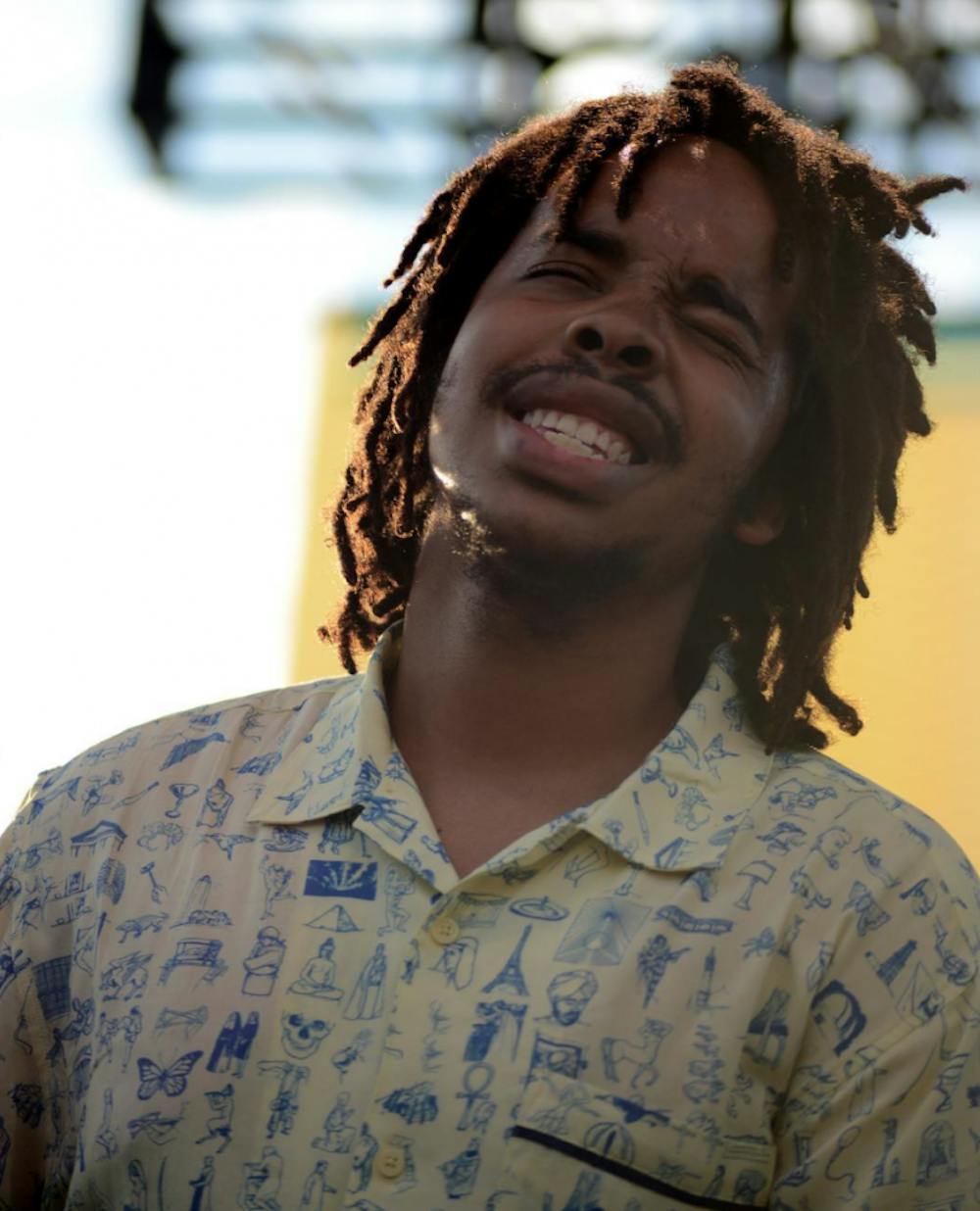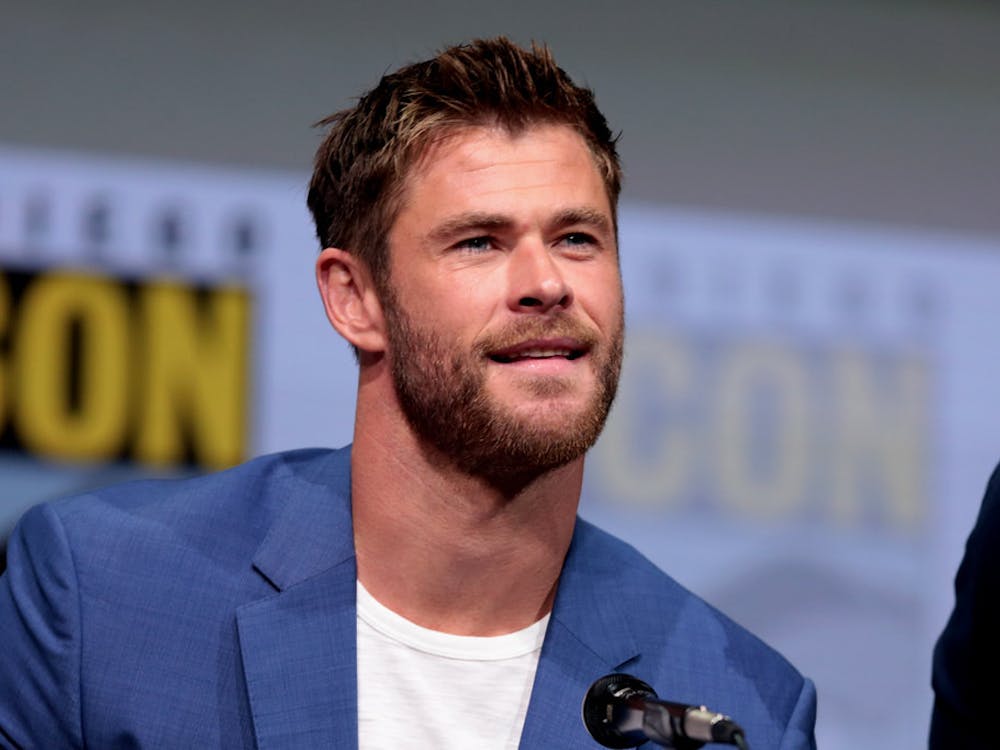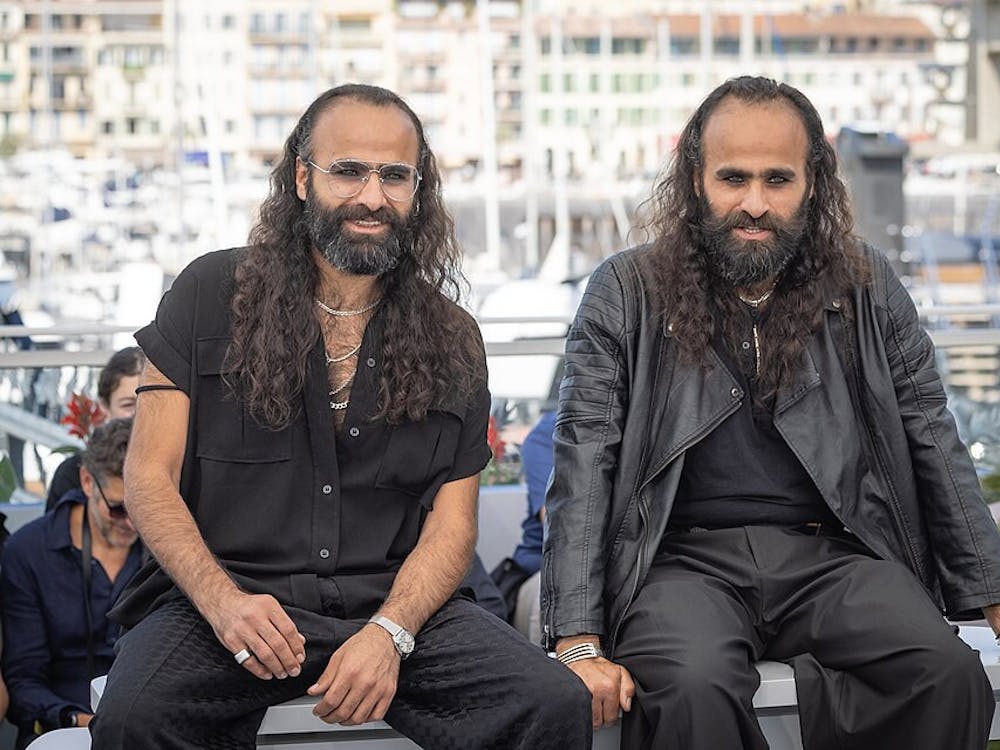Concerts where the artist has to ask the audience to calm down are rare, to say the least. For me, Earl Sweatshirt’s concert on his tour Thebe Kgositsile presents: Fire it Up! A Tour Starring Earl Sweatshirt & Friends at Baltimore Soundstage on Thursday, March 28 was the first of its kind. Even though the mosh trampled me in one of its earliest waves and probably scarred me for life (no, I’m definitely not mad at all), the rhythmic energy that night was nothing short of primal — a wonder to witness.
Even before Earl, born Thebe Kgositsile, appeared onstage, the crowd’s excitement was palpable.
The openers Na-Kel Smith and BbyMutha, both up-and-coming rap artists, amplified the crowd’s enthusiasm, making the concert seem theirs as much as it was Earl’s. Na-Kel’s hype raps kickstarted the mosh pit, and then Bbymutha’s stunning neon visuals prepared the crowd for Earl’s more surreal music. When Earl finally arrived, the audience, to put it simply, lost their shit.
The crowd’s wild response to the artist can be attributed to his underground popularity following his entrance into the rap scene in 2009 with the Los Angeles hip-hop collective Odd Future, whose gifts to music also include Tyler the Creator and Frank Ocean.
He released his first mixtape Earl on the Odd Future website in 2010 at the young age of 16. The album was produced by Tyler, who invited him to Odd Future after listening to the amateur mixtape Kitchen Cutlery Thebe released under the name Sly Tendencies when he was in eighth grade.
Since then his musical arc has only moved upward following the releases of a collaboration with Frank Ocean on “Super Rich Kids” in Ocean’s channel ORANGE (2012); his own albums Doris (2013), I Don’t Like Shit, I Don’t Go Outside (2015); and his most recent endeavor Some Rap Songs (2018). Kelefa Sanneh, in his 2011 New Yorker article “Where’s Earl?,” dubbed him a “prodigy of hip-hop.” With each album, Earl has been proving him right by honing in on his unique voice and gaining a bigger following with each release.
A large factor of what makes Earl’s music so impactful and different is his openness about his personal struggles with depression and anxiety. His honest and raw expression of his feelings about adolescence, family and society are relatable to his listeners, and his artistic style make them a pleasure to listen to.
The artist’s rhymes and lyrics are nothing short of the most sophisticated poetry, like the chorus of Doris’ hit song “Chum”: “Something sinister to it, pendulum swinging slow / A degenerate moving through the city with criminals, stealth / Welcome to enemy turf, harder than immigrants work / ‘Golf’ is stitched into my shirt / Get up off the pavement, brush the dirt up off my psyche / Psyche, psyche.”
His poetic lyrics are perhaps an inheritance received from his father, Keorapetse “Bra Willie” Kgositsile, South Africa’s poet laureate who was exiled from his home country for his activism. Kgositsile and Earl’s mother, Cheryl Harris (a law professor at the University of California, Los Angeles) separated when Earl was six. Their separation, Earl’s distance and estrangement from his father, his complicated relationship with his mother, and the impact they have had on him have been important subjects in his music.
After his father left him, Earl had a rocky relationship with his mother, who sent him to a retreat for at-risk youth in Samoa because of his struggles with mental health and troubling behavior after the release of Earl, an experience that he often refers to in his music and one that led to maturation in his attitude and his music.
He continues to have a complicated relationship with her, which is reflected in his music. For example, in “Faucet,” a track from his sophomore album, I Don’t Like Shit, he raps, “ain’t stepping foot up in my momma place for a minute.”
His relationship with his father though is more rife — Earl often accuses him of abandoning him in his lyrics. Just as the two began to mend bridges, Earl lost his father in January 2018.
His death had a huge impact on Earl’s mental health, causing him to cancel his American tour. Earl’s process of dealing with the lack of closure and the pain of loss culminated in his album Some Rap Songs that was released in November of the same year.
Shortly after, Earl released a short film called “Nowhere, Nobody,” a dreamlike sequence with snippets of music from his album. Both the film and album have a psychedelic quality to them that transports you into the artist’s state of mind.
The 25-minute album is a masterclass in the art of distillation — every sound and every rhyme adds something new to it. It shows Earl at his most experimental, as he raps over ambient lo-fi sounds and samples that manage to simultaneously juxtapose and seamlessly meld into each other.
The track that stands out the most to me is “Playing Possum,” which is less a musical track and closer to spoken word. The track consists of both excerpts from a keynote speech his mother made, in which she thanks her family for her success, and a poem his father wrote about refugees and home.
The penultimate track on the album seems like the culmination of the feelings the album rifles through, ending with the final line of his father’s poem — “To have a home is not a favor.” It represents reconciliation between his parents, gratitude for his mother, and acceptance of his father and his pain.
The concert was a final product of all the growth Earl has seen since his start in the rap scene. Smattered with the best songs from his entire career — like “Burgundy,” “5/5,” “Chum,” “Grief” and “Molasses” (his opener) — Earl sang the entirety of Some Rap Songs and maintained its surrealism throughout the concert.
Kailen Crawford, an undergraduate at Towson University, said, “The way [Earl] chose which song to do next was awesome because it was the right mood-switcher.” It was clear that Earl knew his audience and knew exactly when to energize it or when to turn it down. For example, when he removed his sweatshirt to reveal an ethnic tunic underneath it, the crowd erupted, but he quelled the chaos when the mosh came close to turning into a stampede.
Hopkins junior Sebastian Kettner also commended the incredible effect Earl Sweatshirt managed to have over the crowd.
“The show was special. I’ve never been to a concert that was so unifying,” he wrote in an email to The News-Letter.
Earl ended the concert how he ended his album, with the track “Riot!” which, contrary to its name, is possibly one of the most mellow instrumental sound bites on the album. Like much of his body of work, Earl’s concert subverted our hardwired expectations as he announced his last track. At the end of the song the audience stood patiently for minutes listening to “Riot!” on repeat, waiting for the final encore every artist treats them to, until Earl ran back up onstage to convince the crowd — “It’s over! It’s finished! It’s donezos!”





